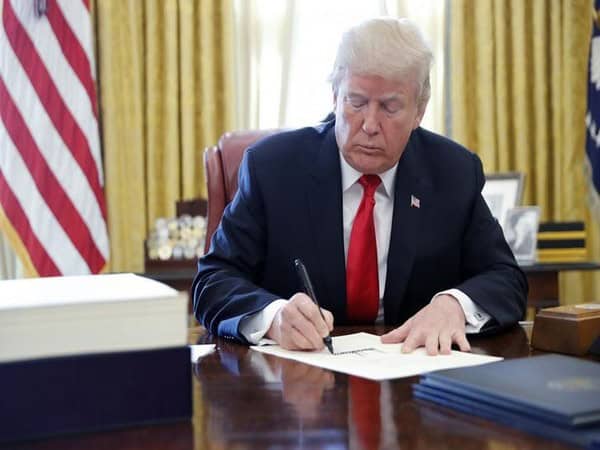Washington: The battle over President Donald Trump’s choice to fill a coming Supreme Court vacancy, an appointment with far-reaching consequences for American society, kicked off in the Senate Thursday as Democrats vowed against the odds to fight any Republican nominee.
Justice Anthony Kennedy’s announced departure at the end of July will give Trump the opportunity to appoint his second justice to the nine-seat bench — and shift the high court decisively to the right.
But one day after the sudden announcement by Kennedy, who has held the tie-breaking vote between the bench’s liberal and conservative judges, the politicization of the process was already clear.
Members of the Republican-controlled Senate were hardening their positions over whether to proceed with the confirmation process before November’s midterm elections, or wait until Americans vote in a new slate of lawmakers to be seated in January.
Trump has said the process to replace Kennedy, 81, will “begin immediately,” raising alarm among Democrats fearful that the president will nominate an ideological conservative, upsetting the court’s delicate balance and locking in a hard-right majority for a generation.
No less than women’s reproductive rights, health care and gay rights are at stake, Democrats said.
“Whomever the president picks, it is all too likely they’re going to overturn health care protections and Roe v. Wade,” warned top Senate Democrat Chuck Schumer, referring to the court’s landmark 1970s ruling that upheld abortion rights.
Senator John Thune, a member of the Republican leadership, acknowledged as much, particularly on overturning Roe v. Wade.
“I think that was a wrongly decided case, and so that’s something I would support,” Thune told reporters.
– Dogfight –
Kennedy’s departure sets up a dogfight over his succession, a blueprint for which was established by Republican lawmakers in 2016 when they denied then-president Barack Obama the opportunity to fill the seat left vacant by conservative justice Antonin Scalia’s death.
That delay, orchestrated by Senate Majority Leader Mitch McConnell, lit a fire under Trump’s grassroots voters during the election, and it ultimately enabled Trump to nominate Scalia’s replacement, Neil Gorsuch.
Democrats demanding a delay now are citing McConnell’s own 2016 argument that a Supreme Court nomination is too consequential not to allow American voters to weigh in through the upcoming election.
“If the Senate’s constitutional duty to advise and consent is just as important as the president’s right to nominate, which the Constitution says it is, why should a midterm election be any less important than a presidential election?” Schumer said.
McConnell rejected that argument as absurd and said the confirmation vote will occur “this fall.”
“We’re right in the middle of this president’s very first term,” he said. “To my knowledge nobody on either side has ever suggested — before yesterday — that the Senate should only process Supreme Court nominations in odd numbered years.”
Senate rules and procedures are in McConnell’s favor, leaving Democrats with little recourse for blocking progress on Trump’s nominee.
– Narrowest of majorities –
Trump said Kennedy’s successor — who like all Supreme Court justices will be appointed for life — would be selected from among a list of 25 possible candidates, many of them young and conservative.
Tipped as a leading contender is Brett Kavanaugh, 53, who once clerked for Justice Kennedy. He was nominated as a federal appeals court judge by president George W. Bush, overriding Democrat concerns he was too partisan, having worked on an investigation of Bill Clinton.
Also on the list is 47-year-old Senator Mike Lee, among the chamber’s most conservative members, and appellate Judge Amul Thapar, who would be the Supreme Court’s first Asian-American justice.
Whoever is nominated will need to thread the needle in the 100-member Senate.
Confirmation requires a majority, after Republican leadership last year invoked the “nuclear option” and dropped the threshold to overcome blocking tactics from 60 to a simple majority.
Republicans hold 51 seats, but Senator John McCain is absent, battling brain cancer. If all Democrats oppose Trump’s nominee, that leaves Republicans with no margin of error.
Two female Republican senators, Susan Collins and Lisa Murkowski, are being closely watched as they have expressed support for women’s reproductive rights.
“I view Roe v. Wade as being settled law,” Collins said Wednesday after Kennedy’s announcement. “It’s clearly precedent and I always look for judges who respect precedent.”
Three Democrats facing tough re-election fights this year are also in the spotlight.
Each of them voted to confirm Gorsuch in 2017, and each released statements after Kennedy’s retirement saying they would carefully consider Trump’s nominee to replace him.
Democratic Senator Robert Menendez said replacing Kennedy is too “monumental” a process to be done months before an election.
“All the things we have cared about as Americans — personal rights, civil rights, reproductive rights, voting rights, LGBT community rights — all of the progress that we have made, is potentially at risk,” he told AFP.
Agence France-Presse

